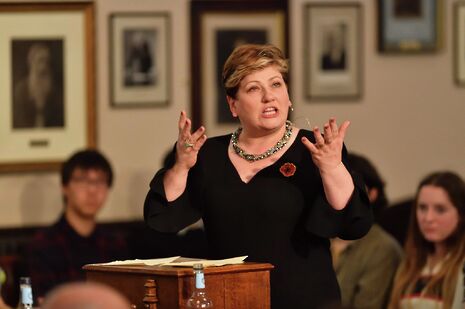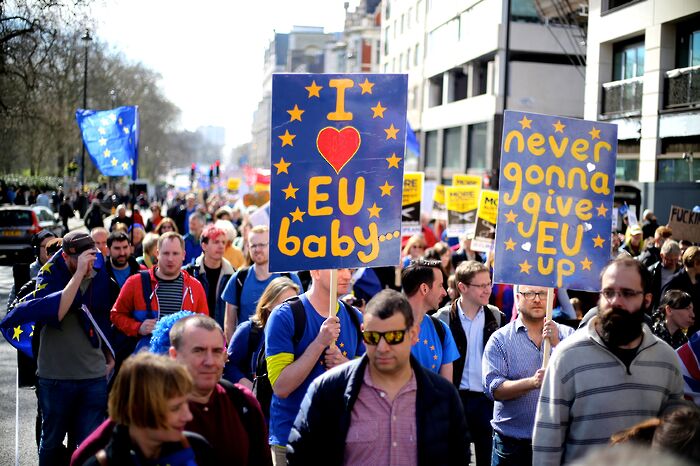Emily Thornberry: “We are fooling ourselves if we think we can sail off into the mid-Atlantic”
Guillermo Íñiguez talks to the shadow foreign secretary about Britain’s post-Brexit future, European socialism and the “illiberal international” threat

I walk into the Cambridge Union with a great sense of excitement. Often described as one of Labour’s most “unusual” politicians, I do not quite know what to expect of Emily Thornberry. In a sense, she can be thought to represent many of the paradoxes that underlie the contemporary Labour Party: a member of the party’s left, she is also a former human rights barrister; is married to a High Court judge and, in 2014, following a controversial tweet, had to resign as Shadow Attorney General under accusations of bad taste and snobbery.
What is clear is that Thornberry is one of the party’s rising stars. First elected an MP in 2005, Thornberry’s career in the Shadow Cabinet began under Ed Miliband, who made her Shadow Attorney General in 2011. It was under Corbyn, however, that she became one of Labour’s leading figures. From Shadow Minister for Employment, she progressed to Shadow Defence Secretary, Shadow Brexit Secretary alongside her role as Shadow Foreign Secretary, which she combines with the role of Shadow First Secretary of State, deputising for Corbyn at PMQs. Her party conference speech in Liverpool, in which she took a firm stance against antisemitism and evoked Labour’s “long history” of fighting the far-right, was seen by some as a possible leadership pitch.
Throughout the interview, Thornberry surprises me with the clarity of her ideas. There is never a second of hesitations in her responses – a characteristic of Thornberry’s at the dispatch box and something she, once again, proven at the subsequent Union debate titled ‘This House Believes that the Special Relationship is Over.’ Asked what the UK’s biggest foreign policy challenge currently is, she is very clear. Britain’s loss of relevance on the world stage means the country has fallen into a “Brexit black hole” from which there is no easy way out. This, combined with the decline of multilateralism and the rise of the so-called “illiberal international”, paints a very bleak picture of a post-Brexit UK.
“I am still grieving for the demise of the left in Brazil”
One of the latest additions to the “illiberal international”, Bolsonaro’s recent victory in Brazil, is also, in Thornberry’s view, one of the saddest. “I am still grieving for the demise of the left in Brazil”, she says. It was not only that Bolsonaro’s victory was facilitated by the controversial fall of Luiz Inácio Lula da Silva, Brazil’s former left-wing president. He was also barred from running for election in a process the UN’s Human Rights Committee described as deeply flawed.
Said victory is particularly dramatic because of the disproportionate effect it will have on those who most need a compassionate government. It was a tremendous backlash “against the idea that the poor in Brazil had a voice, and a government which was going to look after them, to do something about the favelas and to try and bring the country together”. As always with “Trump-style politics”, this project of hope and unity has been replaced by division and hate.
Want to get involved with Varsity interviews?
Meet some of Cambridge's most interesting figures and ask your burning questions. Just join our Interviews Writers group or email our Interviews team to express interest.
Then there’s Europe. Her view on Brexit, as well as that of her party, Thornberry adds, are well known. Her three months as Shadow Brexit Secretary allowed her to realize the extent to which Theresa May’s government lacked a long-term project for a post-Brexit UK. Almost two years later, and despite the increased time pressure, very little has changed.
This, Thornberry highlights, is hugely worrying: “we are fooling ourselves if we think we can sail off into the mid-Atlantic” in the hope that trade deals will negotiate themselves. Labour’s policy, on the other hand, is as clear as it has always been. The only sensible approach for the country is remaining in the Customs Union. That is the only way of having a soft border and mitigating tensions in Ireland.
What role does she think Brexit plays in a continent facing what the New Statesman recently described as a “civil war”? One has to be careful and put things into perspective. “We keep being told [the EU] have other things to think about”, Brexit being a secondary issue they want to get over and done with. “The truth is that a massive economy is leaving the Union, and that will definitely have an effect on Europe.”
The problem the EU is facing is the difficulty of dealing, at the same time, with the short-term crises “smacking them in the face” (which, at present, range from the Italian budgetary dispute to Merkel’s departure) and with the long-term ones – of which Brexit is, perhaps, the most significant. This tension is not new: in fact, she argues, it has been a common factor through all of Europe’s history.
It is for this reason that the identity crisis the EU faces cannot be reduced to one particular event, be that the Eurozone crisis or the refugee crisis. It is, at the end of the day, nothing but a further manifestation of a much more structural debate: one which has been going on since the 1990s and which “Labour was a big part of”. In the run-up to the Maastricht Treaty which brought the European Economic Community closer together, and following the fall of the Iron Curtain, it was thought that the EU could become both deeper (by increasing integration) and wider, by incorporating Eastern Europe.
Helping Eastern Europe “move away from the Soviet Union and come into democracy” was seen almost as a duty owed to the East. Recent events, Thornberry argues, have just shown how, at the time, the EU was wrong – becoming as large as it has has made it “difficult” for the EU to become a “United States of Europe”, something which has allowed the perennial conflict between Europhiles and Eurosceptics to resurface.
“The truth is that a massive economy is leaving the Union, and that will definitely have an effect on Europe.”
One of the biggest victims of this political crisis has, undoubtedly, been the centre-left. All over the continent, social-democratic parties have either been reduced to political irrelevance (as is the case of the Greek Pasokor and the French Parti Socialiste) or face that threat (as with the German SPD or the Italian Democratic Party). Since his election in 2015, Corbyn, Thornberry believes, has played a vital role in revitalizing the European left.
“Jeremy goes to the PES [Party of European Socialists] meetings [attended by all social-democratic leaders across the continent] regularly, and has actually, by doing so, taken PES seriously, challenging other leaders from the Left to do so as well.” But his influence, she thinks, has been more substantial than that. Any initial scepticism about the feasibility of Corbyn’s politics was displaced by his “authenticity”, his “bravery” and his “ability to say things as it is”.
It is partly this that explains why many social-democratic parties within PES are shifting to the left. Although she quotes the Spanish Socialist Workers’ Party under Prime Minister Sánchez as perhaps the most famous example, it is not the only one. Portugal’s government, led by Antonio Costa, has been in power for three years, and the German SPD, Thornberry notes, is facing similar calls to shift to the left in order to avoid electoral oblivion.
The European Parliament election in May is seen by many as the most important one in decades. With the predicted decline of the Party of European Socialists and the European Popular Party; polls showing Marine Le Pen’s Rassemblement National ahead in France; and rumours of Matteo Salvini considering running for European Commissioner, the election will be, in the words of Commission vice-president Frans Timmermanns, a “battle for the soul of Europe.”
Despite the fact that her party will not be running, Thornberry believes Labour will influence the election both positively and negatively. On the one hand, Corbyn will carry on playing the role he currently does – promoting unity, cooperation and clarity of thought among the European left. On the other, however, its absence will have a dramatic effect on the composition of the European Parliament, with the number of Labour members of European Parliament making the party the third biggest member of PES.
The British Labour Party, she concludes, will be “missed”, both in the Parliament and in the continent as a whole – as will, undoubtedly, the UK.
 News / Eight Cambridge researchers awarded €17m in ERC research grants27 December 2025
News / Eight Cambridge researchers awarded €17m in ERC research grants27 December 2025 News / Clare Hall spent over £500k opposing busway 24 December 2025
News / Clare Hall spent over £500k opposing busway 24 December 2025 Comment / League tables do more harm than good26 December 2025
Comment / League tables do more harm than good26 December 2025 Comment / The ‘class’ of Cambridge24 December 2025
Comment / The ‘class’ of Cambridge24 December 2025 News / Caius mourns its tree-mendous loss23 December 2025
News / Caius mourns its tree-mendous loss23 December 2025










